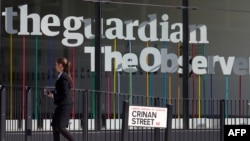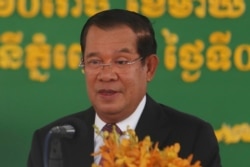Media advocates in Cambodia are pointing to the government's interaction with a British newspaper as an example of how complaints over news coverage should be dealt with.
When the British daily The Guardian incorrectly reported that Prime Minister Hun Sen held a passport from Cyprus, Cambodia's government responded with a letter threatening legal action.
But after the paper printed a correction, the Ministry of Foreign Affairs said it was satisfied by the steps taken to fix the error.
Media advocates have compared the case with the experience of local journalists whom they say risk being prosecuted for similar mistakes. They say that Cambodia should use its press law to handle errors or complaints.
Ith Sothoeuth, media director at the Cambodian Center for Independent Media, commended The Guardian's quick response in correcting its report, and expressed hope that similar interactions could be duplicated with local news outlets.
"I think that this is a good case study or model for the Cambodian government, which should be applied upon the media sector in the country," he said. "When there is false or inaccurate information, there should be a demand for a correction rather than resorting to legal action."
In The Guardian's case, government lawyers wrote to the paper demanding a retraction and threatening legal proceedings after the paper reported incorrectly that Cambodia's prime minister was among thousands of wealthy foreigners who hold a Cypriot passport. The reporting was part of the British publication's Pandora Papers coverage on a leak of financial data on offshore tax havens.
A letter dated October 6, and published on the Ministry of Affairs website, said the error has given a chance to a "handful of evil opportunists to distort and exaggerate the facts leading to a worsening situation with the purposes of inciting people, stirring chaos and destroying public order, security and peace in the Cambodian society."
The Guardian corrected the article that same day, and in an email to the ministry said, "The editor regrets the concern caused to Prime Minister Hun Sen but it is hoped the prompt action to rectify this error provides a satisfactory resolution."
A spokesperson for the Ministry of Foreign Affairs, Koy Kuong, told VOA that potential legal action was no longer being considered because The Guardian ran a timely correction.
"Not only did the response help correct the mistake, but also provided justice, dignity and honor to the leader of our kingdom," Koy Kuong said last week.
Nop Vy, executive director of the Cambodia Journalists Alliance Association, praised the actions of The Guardian and the Ministry of Foreign Affairs, which he said aligned with the press law.
Under that law, newspapers have seven days to publish a correction or response if an individual claims to have been defamed or harmed by reporting. For public figures who claim reporting was false or intended to defame them, a court can order a paper to publish a retraction, pay damages or both.
Nop Vy said he wants to see a similar response with local journalists, such as Youn Chhiv, a publisher who was imprisoned last month after a deputy provincial governor of Koh Kong province filed a complaint.
"There are different standards of implementation in our country, particularly on journalists. The case of The Guardian is one thing, while the case of the journalist in Koh Kong province is another," he said. "This is a sort of implementation which should be reviewed."
Youn Chhiv, who runs the news website Koh Kong Hot News, was accused of false news and defamation.
In May, a coalition of civil society organizations expressed concern at the legal harassment of Cambodian media, saying that at least 72 journalists had been "harassed" by the judiciary, and 42 were detained, questioned, or imprisoned. The coalition found that authorities often used charges of incitement under Articles 494 and 495 of the Criminal Code.
That trend has continued in recent months. The Cambodia Journalists Alliance Association reported at least 21 cases of journalists being harassed, questioned, or detained between July and September of this year, including while covering land disputes.
Meas Sophorn, a spokesperson for the Ministry of Information, defended the use of legal action against journalists, noting that Article 10 of the press law allows for an individual to sue for defamation or libel.
"It depends on the individual who is affected by the false or inaccurate news," Meas Sophorn said. "If he thinks that the publication severely affects his dignity and honor, he can file the lawsuit directly without demanding correction or clarification."
While Article 10 allows a complainant to seek financial damages, journalists often face accusations outside of the press law, including incitement, which can carry prison terms.
Am Sam Ath, deputy director at rights group Licadho, said that authorities should only resort to criminal charges when the offense occurs outside of the professional realm.
"The press law should be used to ensure the career and professionalism of journalists, except the case in which the journalists committed crimes which are not related to their profession or journalism code of conduct," he said.









